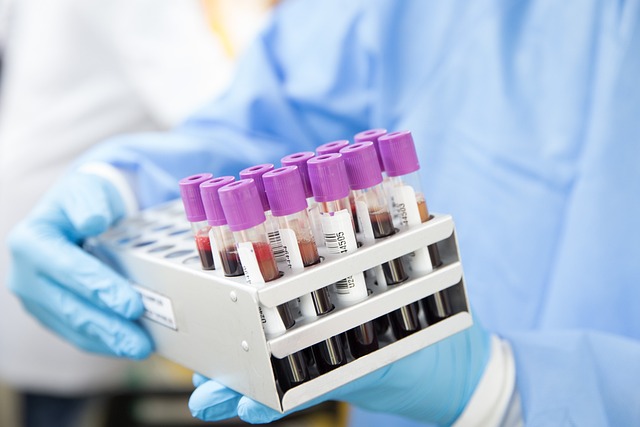Vitamin deficiencies, common yet overlooked, significantly impact health. Simple blood tests identify these issues early, enabling timely intervention. These tests measure key vitamins like D, B12, and iron, crucial for diverse bodily functions. Accurate results guide personalized dietary changes or supplementation to prevent complications. Regular testing ensures optimal nutrition and well-being.
Discover the power of a quick, efficient blood test for identifying vitamin deficiencies—a game-changer in modern healthcare. This comprehensive guide explores how these tests work, from understanding common types of deficiencies and their symptoms to interpreting results for effective treatment. Learn about key vitamins measured and why this simple procedure is revolutionizing nutrient assessment, enabling prompt and targeted interventions.
- Understanding Vitamin Deficiencies: Common Types and Symptoms
- The Role of Blood Tests in Diagnosing Vitamin Deficiencies
- How Quick and Efficient Blood Test Procedures Work
- Key Vitamins Measured: Essential Nutrients to Assess
- Interpreting Results and Next Steps for Effective Treatment
Understanding Vitamin Deficiencies: Common Types and Symptoms
Vitamin deficiencies are common health issues that can often go unnoticed, but they play a significant role in overall well-being. These deficiencies occur when the body lacks sufficient amounts of essential vitamins, which are vital for various bodily functions. Understanding vitamin deficiencies is the first step towards effective management and treatment.
There are numerous types of vitamin deficiencies, each with its unique set of symptoms. One of the most well-known is Vitamin D deficiency, often associated with bone health issues due to inadequate calcium absorption. Another prevalent one is Vitamin B12 deficiency, which can lead to fatigue, weakness, and neurological problems. Iron deficiency anemia, characterized by low iron levels, causes symptoms like pale skin, shortness of breath, and dizziness. Identifying these deficiencies through a simple blood test for vitamin deficiency is a quick and efficient way to ensure timely intervention and improve overall health outcomes.
The Role of Blood Tests in Diagnosing Vitamin Deficiencies
Blood tests play a pivotal role in diagnosing and identifying vitamin deficiencies. These tests offer a quick and efficient method to assess an individual’s nutritional status by measuring the levels of specific vitamins in their bloodstream. By analyzing a small sample of blood, healthcare professionals can gain valuable insights into potential vitamin deficits, enabling them to make informed decisions regarding treatment and supplementation.
The ability to perform blood tests for vitamin deficiencies is a game-changer in personalized healthcare. It allows for early detection, which is crucial as untreated vitamin deficiencies can lead to various health complications. With just a simple prick of the finger, these tests provide a non-invasive way to uncover hidden nutritional gaps, ensuring folks receive tailored interventions to optimize their overall well-being.
How Quick and Efficient Blood Test Procedures Work
Quick and efficient blood tests for vitamin deficiencies are transforming the way healthcare professionals identify nutrient gaps in patients’ diets. These advanced procedures involve taking a small sample of blood, typically from a vein in the arm, using sterile techniques to minimize the risk of infection. The collected sample is then analyzed using sophisticated laboratory equipment and software designed to detect specific vitamins at precise levels.
The testing process is highly accurate and rapid. Lab technicians measure the concentration of various vitamins in the blood, comparing these readings against established normal ranges to identify deficiencies. This data provides valuable insights into an individual’s overall health status and nutritional needs. By pinpointing specific vitamin deficiencies early on, healthcare providers can recommend appropriate dietary adjustments or supplements to correct imbalances and promote optimal well-being.
Key Vitamins Measured: Essential Nutrients to Assess
When conducting a blood test for vitamin deficiency, several key vitamins are measured to assess overall nutritional status. The most common panels look at levels of Vitamin D, Vitamin B12, and iron. These nutrients are essential for various bodily functions, from bone health and immune system support to energy production and cognitive function.
Vitamin D is crucial for calcium absorption, which is vital for maintaining strong bones and teeth. Deficiencies can lead to conditions like rickets in children and osteomalacia in adults. Vitamin B12 plays a critical role in red blood cell formation and nerve function, while iron is indispensable for transporting oxygen throughout the body. Iron deficiency, for example, can result in anemia, characterized by fatigue and shortness of breath.
Interpreting Results and Next Steps for Effective Treatment
Interpreting results from a blood test for vitamin deficiency is crucial for effective treatment. Each vitamin has specific reference ranges, and values falling outside these may indicate deficiency or excess. For instance, vitamin D levels below 20 ng/mL (nanograms per milliliter) are often considered deficient, while excessive vitamin B12 levels could suggest a tumor or other health issues. Once identified, the next steps involve tailoring treatment accordingly. This might include dietary changes, such as incorporating more vitamin-rich foods, or taking supplements prescribed by a healthcare professional to restore optimal levels and prevent further complications associated with long-term deficiency.
A quick and efficient blood test for vitamin deficiency identification is a valuable tool in modern healthcare. By understanding common types, their symptoms, and leveraging blood tests effectively, medical professionals can accurately diagnose and treat deficiencies promptly. These procedures measure key vitamins, providing insights into an individual’s nutritional status and guiding personalized treatment plans. In today’s digital era, such advancements enhance our ability to navigate and address vitamin deficiency issues, fostering better overall health and well-being.
